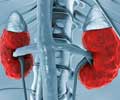Vascular calcification due to Vitamin K deficiency in dialysis patients can be treated by supplementing Vitamin K2.
- Vascular calcification occurs when calcium accumulates in the various layers of the vessel wall. It is highly prevalent in certain patient populations, especially in those with chronic kidney disease.
- Vitamin K may contribute to reducing vascular calcification in patients at higher risk.
- Supplementing Vitamin K2 for 4 weeks reduces vascular calcification by 86% in patients with chronic kidney disease.
Vascular Calcification in Chronic Kidney Disease
Accumulation of calcium in the layers of arterial walls is known as vascular calcification and is associated with atherosclerosis.CAC is detectable in approximately 30% of adults without cardiovascular disease and predicts the risk of future cardiovascular events such as a heart attack or sudden cardiac arrest. CKD patients are at an increased risk for CAC.
CKD patients are also prone to medial calcification (known as Monckeberg’s sclerosis), which leads to arterial stiffening, elevated systolic pressure, and increased cardiac workload. Medial calcification is predictive of cardiovascular and all-cause mortality in CKD patients, independent of intimal calcification and CVD risk factors.
The cellular and molecular events leading to calcium deposition in vascular tissue need to be explored, but it is understood to be a highly regulated process.
Vitamin K Deficiency Associated with Vascular Calcification
Various studies at the molecular level, and in animals, have demonstrated that vitamin K is involved in the development and progression of vascular calcification, and is mediated by the carboxylation of matrix gla protein (MGP). MGP is synthesized by vascular smooth muscle cells (VSMC) and inhibits calcification.A lack of functional MGP may increase risk of vascular calcification.
Vitamin K is required as an enzymatic cofactor for MGP to inhibit soft-tissue calcification. Warfarin, which antagonizes the vitamin K-dependent carboxylation of MGP, also leads to rapid arterial calcification in rats.
A high prevalence of subclinical vitamin K deficiency exists in hemodialysis and peritoneal dialysis patients and in individuals with earlier stages of CKD.
Vitamin K deficiency based on very low circulating concentrations of phylloquinone in patients with CKD is 6%, hemodialysis is 28% and peritoneal dialysis is 24%.
In CKD, dietary vitamin K intake may be compromised for at least 2 reasons. First, the renal diet for CKD is restricted with respect to potassium-rich foods which are also a good source of vitamin K. Secondly, the overall energy intake is less due to anorexia and gastrointestinal symptoms.
Supplementing Vitamin K2 reduces Vascular Calcification
Phylloquinone (Vitamin K1) is the primary form of vitamin K in most diets, which is found primarily in green leafy vegetables and vegetable oils.Vitamin K2 or Menaquinones found in meat and dairy-based foods and fermented soybeans, known as natto are also good sources. In most diets, menaquinones generally contribute less to total dietary vitamin K intakes than phylloquinone.
But as far as assessment is concerned, menaquionones are better indicators of Vitamin K status than phylloquinone so supplementing Vitamin K2 in CKD patients might reduce calcification and compensate for the deficiency of the Vitamin.
A study was done among 50 patients who undergo dialysis. MenaQ7 was supplemented for 4 weeks. Vitamin K2 levels were assessed by plasma dephosphorylated uncarboxylated matrix Gla protein (dp-ucMGP) levels. This biomarker is a K2 dependent protein is an inactive form of MGP and inhibits tissue calcification.
The researchers noted, “This is the first study to show that hemodialysis patients in the Eastern Mediterranean region have very high levels of dp-ucMGP . It denotes profound Vitamin K deficiency.”
Daily administration of 360 micrograms of Vitamin K2 reduced dp-ucMGP by 86% after 4 weeks. Researchers from Saint Joseph University and Saint George hospital found that the supplement was well tolerated.
VC is usually measured by aortic calcification score but is also associated with dp-ucMGP. So the protein levels could be used as a marker of VC.
The authors said, “Our study revealed that dp-ucMGP increases linearly with the increase of the calcification score assessed by a lateral abdominal x-ray which depicts aortic calcification score.”
Conclusion
Individuals with CKD represent a rapidly growing segment at increased risk for vitamin K deficiency. Currently, there are no clinical practice guidelines that recommend routine vitamin K supplementation for individuals with CKD outside of patients exposed to long-term oral antibiotics.Vascular calcification is also a characteristic of other chronic health conditions other than CKD, and further studies on vitamin K supplementation might prove beneficial.
Reference:
- Vitamin K Status and Vascular Calcification: Evidence from Observational and Clinical Studies - (https://www.ncbi.nlm.nih.gov/pmc/articles/PMC3648716/)
- M. Kyla Shea* and Rachel M. Holden, Vitamin K Status and Vascular Calcification: Evidence from Observational and Clinical Studies, Adv Nutr. (2012), doi: 10.3945/an.111.001644
















